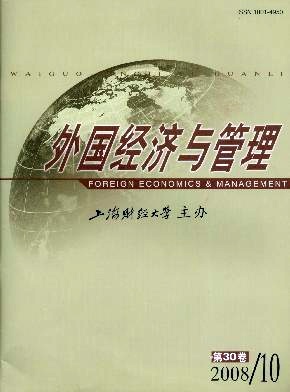知识经济时代的职业生涯发展:模式转变与管理平衡
外国经济与管理 2008 年 第 30 卷第 10 期, 页码:39 - 44
摘要
参考文献
摘要
知识经济时代市场和组织环境的变化对职业生涯管理产生了深刻的影响。本文从个体和组织两个层面,剖析了当代职业生涯发展及管理模式的转变,然后基于一个相对平衡的视角,对职业生涯发展的理论研究与管理实践进行了反思,并从个体与组织职业生涯管理的动态平衡系统出发,对未来的研究方向进行了展望。
[1]Arthur,M B,and Rousseau,D M.The boundaryless career as a new employment principle[A].in Arthur,M B,and Rousseau,D M(Eds.).The boundaryless career[C].New York:Oxford University Press,1996.
[2]Hall,D T,and Chandler,D E.Psychological success:When the career is a calling[J].Journal of Organizational Behavior,2005,26:155-176.
[3]Arthur,M B,Khapova,S N,and Wilderom,C P M.Career success in a boundaryless career world[J].Journal of Organizational Behavior,2005,26:177-202.
[4]Gunz,H P,and Heslin,P A.Reconceptualizing career success[J].Journal of Organizational Behavior,2005,26:105-111.
[5]Baruch,Y,and Winkelmann-Gleed,A.Multiple commitments:A conceptual framework and empirical investigation in a communityhealth service trust[J].British Journal of Management,2002,13:337-357.
[6]Cohen,A.Multiple commitments in the workplace:An integrative approach[M].Mahwah,NJ:Lawrence Erlbaum Associates,2003.
[7]Briscoe,J P,Hall,D T,and Frautschy DeMuth,R L.Protean and boundaryless careers:An empirical exploration[J].Journal of Voca-tional Behavior,2006,67:30-47.
[8]Hall,D T.Careers in and out of the organization[M].Thousand Oaks,CA:Sage Publication,2002.
[9]Hall,D T.The protean career:A quarter-century journey[J].Journal of Vocational Behavior,2004,65(1):1-13.
[10]Arthur,M B,Claman,P H,and DeFillippi,R J.Intelligent enterprise,intelligent careers[J].Academy of Management Executive,1995,9(4):7-22.
[11]Jones,C,and DeFillippi,R J.Back to the future in film:Combining industry and self-knowledge to meet career challenges of the 21stcentury[J].Academy of Management Executive,1996,10(4):89-103.
[12]Waterman,R H,Waterman,J A,and Collard,B A.Toward a career-resilient workforce[J].Harvard Business Review,1994,72(4):87-95.
[13]Hall,D T,and Moss,J E.The new protean career contract:Helping organizations and employees adapt[J].Organizational Dynamics,1998,34(4):22-37.
[14]Baruch,Y.Employability-substitute to loyalty?[J].Human Resource Development International,2001,4(4):543-566.
[15]Quick,J C,and Tetrick,L.Handbook of occupational health psychology[R].Washington,DC:American Psychological Association,2002.
[16]McDonald,P,Brown,K,and Bradley,L.Have traditional career paths given way to protean ones?Evidence from senior managers inthe Australian public sector[J].Career Development International,2005,10(2):109-129.
[17]Heslin,P A.Conceptualizing and evaluating career success[J].Journal of Organizational Behavior,2005,26:113-136.
[18]Baruch,Y.Career development in organizations and beyond:Balancing traditional and contemporary viewpoints[J].Human ResourceManagement Review,2006,16:125-138.
[19]Sullivan,S E,Carden,W A,and Martin,D F.Careers in the next millennium:Directions for future research[J].Human ResourceManagement Review,1998,8:165-185.
[20]Baruch,Y.Transforming careers-from linear to multidirectional career paths:Organizational and individual perspective[J].CareerDevelopment International,2004,9(1):58-73.
[2]Hall,D T,and Chandler,D E.Psychological success:When the career is a calling[J].Journal of Organizational Behavior,2005,26:155-176.
[3]Arthur,M B,Khapova,S N,and Wilderom,C P M.Career success in a boundaryless career world[J].Journal of Organizational Behavior,2005,26:177-202.
[4]Gunz,H P,and Heslin,P A.Reconceptualizing career success[J].Journal of Organizational Behavior,2005,26:105-111.
[5]Baruch,Y,and Winkelmann-Gleed,A.Multiple commitments:A conceptual framework and empirical investigation in a communityhealth service trust[J].British Journal of Management,2002,13:337-357.
[6]Cohen,A.Multiple commitments in the workplace:An integrative approach[M].Mahwah,NJ:Lawrence Erlbaum Associates,2003.
[7]Briscoe,J P,Hall,D T,and Frautschy DeMuth,R L.Protean and boundaryless careers:An empirical exploration[J].Journal of Voca-tional Behavior,2006,67:30-47.
[8]Hall,D T.Careers in and out of the organization[M].Thousand Oaks,CA:Sage Publication,2002.
[9]Hall,D T.The protean career:A quarter-century journey[J].Journal of Vocational Behavior,2004,65(1):1-13.
[10]Arthur,M B,Claman,P H,and DeFillippi,R J.Intelligent enterprise,intelligent careers[J].Academy of Management Executive,1995,9(4):7-22.
[11]Jones,C,and DeFillippi,R J.Back to the future in film:Combining industry and self-knowledge to meet career challenges of the 21stcentury[J].Academy of Management Executive,1996,10(4):89-103.
[12]Waterman,R H,Waterman,J A,and Collard,B A.Toward a career-resilient workforce[J].Harvard Business Review,1994,72(4):87-95.
[13]Hall,D T,and Moss,J E.The new protean career contract:Helping organizations and employees adapt[J].Organizational Dynamics,1998,34(4):22-37.
[14]Baruch,Y.Employability-substitute to loyalty?[J].Human Resource Development International,2001,4(4):543-566.
[15]Quick,J C,and Tetrick,L.Handbook of occupational health psychology[R].Washington,DC:American Psychological Association,2002.
[16]McDonald,P,Brown,K,and Bradley,L.Have traditional career paths given way to protean ones?Evidence from senior managers inthe Australian public sector[J].Career Development International,2005,10(2):109-129.
[17]Heslin,P A.Conceptualizing and evaluating career success[J].Journal of Organizational Behavior,2005,26:113-136.
[18]Baruch,Y.Career development in organizations and beyond:Balancing traditional and contemporary viewpoints[J].Human ResourceManagement Review,2006,16:125-138.
[19]Sullivan,S E,Carden,W A,and Martin,D F.Careers in the next millennium:Directions for future research[J].Human ResourceManagement Review,1998,8:165-185.
[20]Baruch,Y.Transforming careers-from linear to multidirectional career paths:Organizational and individual perspective[J].CareerDevelopment International,2004,9(1):58-73.
引用本文
王忠军, 龙立荣. 知识经济时代的职业生涯发展:模式转变与管理平衡[J]. 外国经济与管理, 2008, 30(10): 39–44.
导出参考文献,格式为:
下一篇:品牌延伸反馈效应研究述评





 7313
7313  874
874

